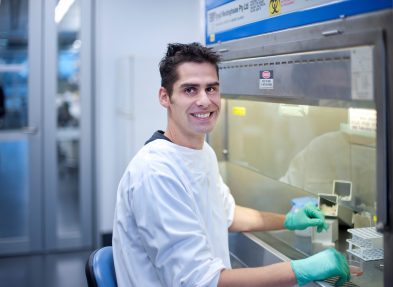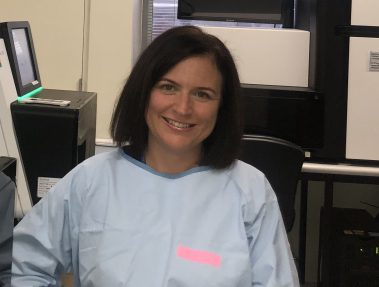Leukaemia Foundation invests $2.6m+ in innovative myeloma research
Better understanding and treating myeloma is the focus of eight research projects that are part of the Leukaemia Foundation’s National Research Program.
This $2.62 million investment into myeloma research at some of Australia’s leading research centres is aimed at developing better diagnostics including genetic testing and monitoring myeloma, developing a range of new and targeted therapies, and improving quality of life.
Strategic Ecosystem Research Partnerships (SERP)
Of the Leukaemia Foundation’s nine current Strategic Ecosystem Research Partnership projects, four are focused on myeloma.
The development and approval of several new myeloma drugs over the last five years has resulted in positive treatment outcomes for many people living with myeloma. Despite all these new drugs, it is understood that many people living with myeloma will, at some stage, stop responding to therapy and relapse. It is thought that a population of dormant, or ‘sleep-like’, myeloma cells hidden in discrete bone marrow niches survive current therapy and reactivate, or ‘wake up’, leading to relapse. To cure myeloma, it is essential to kill these rare, therapy-resistant dormant cells.
The Leukaemia Foundation is supporting a research consortium headed by professors Andrew Zannettino (South Australian Health and Medical Research Institute, Adelaide) and Peter Croucher (Garvan Institute of Medical Research, Sydney). This project combines their expertise in cancer cell dormancy, the role of the immune system in cancer control, and how the cancer cell environment of the bone marrow contributes to cancer growth to examine The role of the bone marrow microenvironment in myeloma development.
This research, due for completion in July 2022, will identify new markers of myeloma cancer cell dormancy that will be used to specify which types of treatments are likely to have the most favourable clinical outcomes for myeloma patients, and to develop a diagnostic test to identify the indolent stages of myeloma, called monoclonal gammopathy of undetermined significance (MGUS), and smoldering myeloma (SM).

Associate Professor Jake Shortt and his team at Monash University (Melbourne) received a two-year SERP, funded to July 2021, for research titled, Characterisation of a novel DCAF factor as a blood cancer therapy. Prof. Shortt has identified a new class of small ‘drug-like’ molecules that preliminary lab-based tests show can kill myeloma cells that are inherently resistant to existing treatments. This project will develop lead drug candidates in a series of experiments designed to accelerate progression to human trials and will be tested in combination with existing myeloma therapies.
Dr Daniel Gray’s lab at the Walter and Eliza Hall Institute of Medical Research (Melbourne) has identified a way to study how blood cancers develop resistance to therapy using a technology called mass cytometry CyTOF. This project, Deep profiling of ALL and myeloma for targeted therapies, will identify relevant disease pathways at the single-cell level for a better understanding of the mechanism by which blood cancer cells acquire treatment resistance and determining the impact of directed combination targeted therapy on treatment resistant blood cancer cell populations. The two-year deep profiling study, funded to August 2021, will analyse samples from patients taken before, during and after therapy. The aim is to apply the preliminary results observed in myeloma to acute lymphoblastic leukaemia, which could lead to the design of better treatments and outcomes for these patients.

Genomic medicine has the potential to transform the delivery of healthcare today and into the future but the widespread use of genomics in clinical practise is not yet a reality for blood cancer patients. The SA Genomics Health Alliance, Haematological Malignancies Node, headed by Dr Anna Brown at the University of South Australia (Adelaide), is developing state-of-the art molecular genetic testing in cancer diagnosis and monitoring, enabling the provision of precision medicine and improved patient outcomes.

This includes a single test cancer specific diagnostic gene panel which can identify mutations in more than 60 clinically relevant genes at the same time in myeloma, MPN, MDS, Primary and Secondary AML. An article on this research, due to be completed in November, was featured in the April 2019 issue of Myeloma News.
Translational Research Program (TRP)
The Leukaemia Foundation’s Translational Research Program is co-funded with the Leukemia & Lymphoma Society (U.S.) and Snowdome Foundation. One of the five current TRP projects is for myeloma, which remains incurable, despite the advances in treatments.

Dr Stephen Nutt of the Walter and Eliza Hall Institute (Melbourne) received a three-year TRP grant. His project, Therapeutic targeting of IRF4 to treat multiple myeloma, will use a new approach to identify and test drugs that can block the growth of myeloma cells. A factor called IRF4 is essential for the survival of myeloma and therefore represents an excellent potential drug target. This project seeks to develop a small molecule inhibitor of IRF4 to directly inhibit IRF4 function or promote its degradation.
PhD scholarships
The Leukaemia Foundation is helping the brightest medical and science graduates pursue a research career in blood cancer by collaborating with the Haematology Society of Australia and New Zealand (HSANZ) to co-fund PhD scholarships.
Over the last two years we have been proud to award six scholarships through our PhD Scholarship Program.
Last updated on November 24th, 2021
Developed by the Leukaemia Foundation in consultation with people living with a blood cancer, Leukaemia Foundation support staff, haematology nursing staff and/or Australian clinical haematologists. This content is provided for information purposes only and we urge you to always seek advice from a registered health care professional for diagnosis, treatment and answers to your medical questions, including the suitability of a particular therapy, service, product or treatment in your circumstances. The Leukaemia Foundation shall not bear any liability for any person relying on the materials contained on this website.
